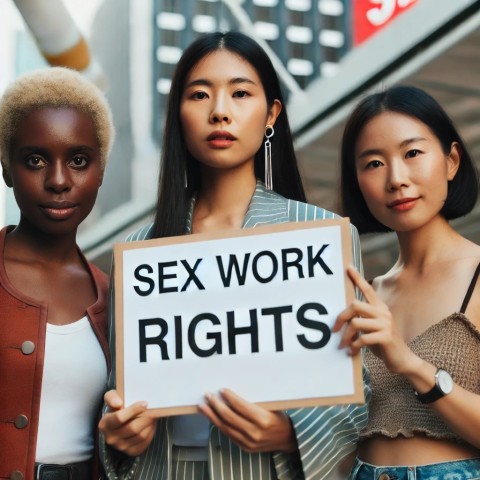The escort industry is one that has long been shrouded in secrecy and stigma, but in recent years, a growing number of escorts including Atlantic City escorts have stepped into the spotlight as activists, advocating for their rights and fighting for societal recognition and respect. These individuals are not only challenging the legal and social barriers that have historically marginalized sex workers but are also reshaping the narrative around sex work. From major cities to coastal communities like those served by escorts in Atlantic Beach, their stories reflect a broader movement for change. This comprehensive exploration delves into the lives of escort activists, examining their campaigns, successes, and ongoing battles, while also highlighting the intersection of race and sex work through the stories and experiences of escorts from marginalized racial backgrounds.
Escort Activism and the Fight for Sex Workers' Rights
The concept of escort activism is rooted in the broader movement for sex workers' rights, which seeks to decriminalize sex work, eliminate stigma, and ensure that sex workers have access to the same legal protections and social services as workers in other industries. This movement has gained momentum over the past few decades, driven by a combination of grassroots organizing, academic research, and increased media attention. Escort activists play a crucial role in this movement, using their platforms to advocate for change and share their personal experiences to humanize the issues at stake.
Key Organizations Leading Escort Activism Globally
One prominent example of escort activism is the work of organizations like the Sex Workers Outreach Project (SWOP) and the Red Umbrella Fund. These organizations provide support and advocacy for sex workers, including escorts, and work to change public perceptions and policies. SWOP, for instance, offers resources and a sense of community for sex workers, while also engaging in advocacy efforts to decriminalize sex work and promote the health and safety of sex workers. The Red Umbrella Fund, meanwhile, provides funding and support for sex worker-led organizations worldwide, enabling them to carry out their advocacy and support activities.
Decriminalization: A Core Mission of Escort Activism
A key aspect of escort activism is the fight for decriminalization. Many escort activists argue that criminalizing sex work only serves to marginalize sex workers further, pushing them into dangerous situations and preventing them from seeking help when needed. Decriminalization, they argue, would allow sex workers to work more safely and openly, reducing the risk of violence and exploitation. Research supports this argument, with studies showing that decriminalization can lead to significant improvements in the health and safety of sex workers. For instance, a study conducted in New Zealand, where sex work was decriminalized in 2003, found that sex workers experienced better working conditions, greater access to health services, and improved relationships with law enforcement.
The fight for decriminalization is not just about changing laws; it's also about changing public perceptions. Escort activists work tirelessly to challenge the stereotypes and stigma that surround sex work. They use social media, public speaking engagements, and media appearances to share their stories and educate the public about the realities of sex work. By doing so, they aim to humanize sex workers and shift the narrative from one of exploitation and victimization to one of agency and empowerment.
Media Visibility and Ongoing Barriers in Escort Activism
One notable success in this area is the growing visibility and acceptance of sex worker voices in mainstream media. Documentaries, articles, and books that highlight the experiences and perspectives of sex workers have become more common, helping to challenge stereotypes and promote understanding. For example, the documentary "The Scarlet Road" follows the life of a sex worker and activist, showcasing her work and the challenges she faces. Similarly, books like "Revolting Prostitutes" by Juno Mac and Molly Smith provide an in-depth look at the sex workers' rights movement, drawing on both personal experiences and academic research.
Despite these successes, escort activists continue to face significant challenges. Legal barriers remain a major obstacle, with many countries still criminalizing some or all aspects of sex work. Even in places where sex work is legal or decriminalized, sex workers often face discrimination and exclusion from mainstream services and opportunities. For instance, many banks and financial institutions refuse to provide services to sex workers, citing concerns about legality and morality. This financial exclusion can make it difficult for sex workers to manage their earnings and plan for their futures.
Confronting Violence and Intersectional Discrimination in Escort Activism
Another major challenge is the violence and exploitation that many sex workers face. While decriminalization can help reduce these risks, it is not a panacea. Escort activists work to address these issues through a combination of advocacy, direct support, and community-building. For instance, many activist organizations provide safety tips and resources for sex workers, help them connect with supportive services, and advocate for stronger legal protections against violence and exploitation.
The intersection of race and sex work adds another layer of complexity to the issues faced by escort activists. Escorts from marginalized racial backgrounds often face compounded discrimination and stigma, both within the sex work industry and in broader society. This intersectionality the interconnected nature of social categorizations such as race, class, and gender as they apply to a given individual or group, regarded as creating overlapping and interdependent systems of discrimination or disadvantage is a key focus of many escort activists.
For instance, Black and Indigenous sex workers often face higher levels of violence and police harassment compared to their white counterparts. This is due in part to systemic racism and the over-policing of communities of color. Research has shown that racialized sex workers are more likely to be targeted by law enforcement and face harsher penalties. This increased scrutiny can make it difficult for them to work safely and access necessary services.
Escort activists from marginalized racial backgrounds are working to address these issues by advocating for policies that recognize and address the specific challenges faced by racialized sex workers. This includes pushing for anti-racism training for law enforcement and service providers, as well as advocating for policies that reduce police involvement in sex work and instead focus on harm reduction and support.
Community, Solidarity, and the Ongoing Fight for Escort Rights
The experiences of escorts from marginalized racial backgrounds also highlight the importance of community and solidarity. Many of these individuals find support and empowerment through networks of peers who share their experiences and challenges. These communities provide a safe space for sharing advice, offering support, and celebrating successes. They also serve as a platform for collective action, enabling escorts to organize and advocate for their rights more effectively.
The fight for rights and recognition in the escort industry is a multifaceted and ongoing battle. Escort activists play a crucial role in this fight, using their platforms to advocate for change, share their personal experiences, and challenge societal perceptions of sex work. Their efforts have led to significant successes, including increased visibility and acceptance of sex worker voices, legal reforms, and improved working conditions for sex workers. However, significant challenges remain, including legal barriers, discrimination, violence, and the intersectional issues faced by escorts from marginalized racial backgrounds. By continuing to advocate for their rights and build supportive communities, escort activists are paving the way for a more inclusive and equitable future for all sex workers.













